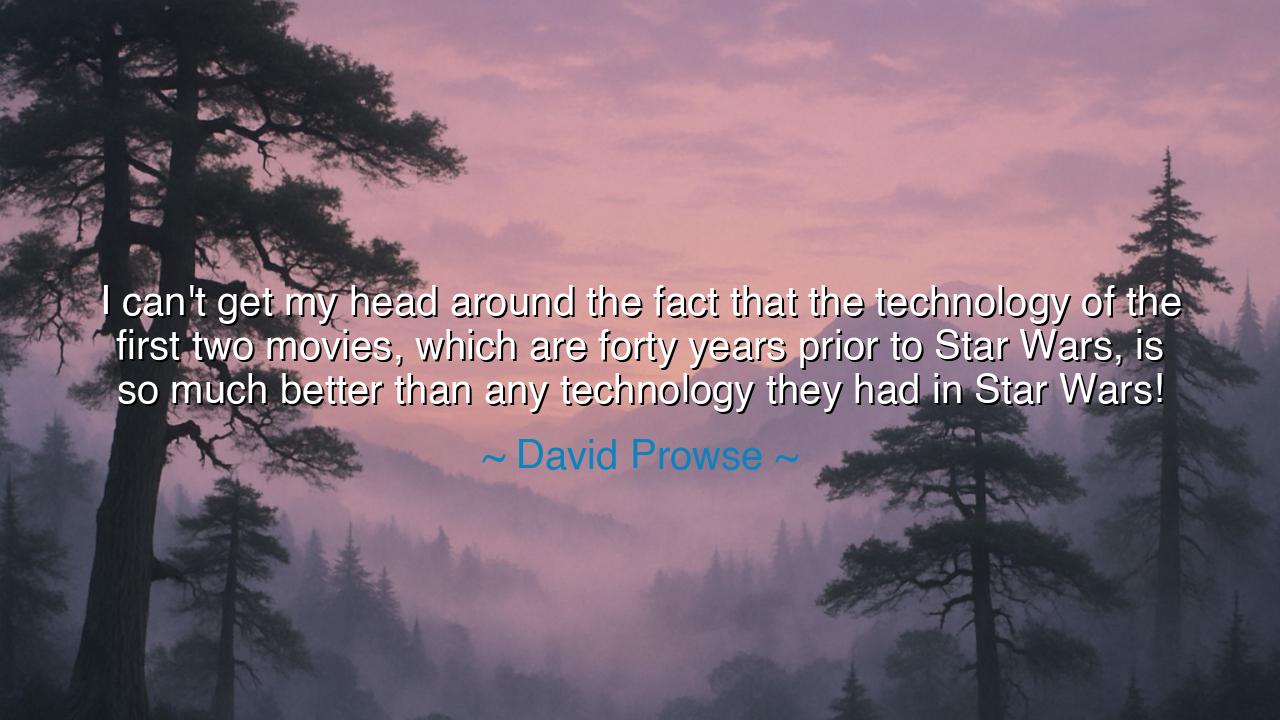
I can't get my head around the fact that the technology of the
I can't get my head around the fact that the technology of the first two movies, which are forty years prior to Star Wars, is so much better than any technology they had in Star Wars!






Hear the words of David Prowse, the man who gave flesh and form to the towering figure of Darth Vader, as he exclaimed with wonder and confusion: “I can’t get my head around the fact that the technology of the first two movies, which are forty years prior to Star Wars, is so much better than any technology they had in Star Wars!” Though at first these words seem but a jest about film and fiction, they conceal a truth of great weight. For they speak to the paradox of technology, of progress and regression, of how tales are woven, and of how men grapple with the mysteries of time.
In his lament, Prowse speaks of the technology within the Star Wars saga itself—the strange truth that in the story’s timeline, the “earlier” episodes, the prequels, shimmer with worlds rich in shining cities, vast starships, and advanced marvels. Yet the later films, though set after these in history, show a universe more rugged, worn, and primitive in its tools. Thus he marvels: how can the past gleam brighter than the future? His words, though about a space opera, strike a chord deeper than cinema; they remind us that progress is not a straight line, but a cycle, a rise and fall, a waxing and waning like the moon.
This truth is not new to our age. In the days of Rome, there were aqueducts that carried water with genius so perfect that many stand strong even now. There were roads that bound empires, amphitheaters where tens of thousands gathered, and public baths filled with ingenious heating systems. Yet after the empire’s fall, much of this technology vanished into shadow. Centuries passed before men could again build with such mastery. Thus, just as in the tales of Star Wars, the ancient past seemed brighter with knowledge than the future that followed it. Prowse, though speaking of fiction, echoed the eternal lesson of history: greatness is fragile, and advancement can wither if wisdom is not preserved.
In the myth of Icarus, the youth soared on wings crafted of wax and feather, but his pride led him too near the sun, and he fell. So too may civilizations rise to staggering technologies, only to fall into ashes through pride, neglect, or folly. The galaxies of Star Wars mirror this eternal rhythm—Republics rising to splendor, then crumbling into darkness, leaving their children to scavenge in the ruins. Prowse, perhaps unknowingly, gave voice to a truth all men must heed: the light of progress is not eternal unless guarded by vigilance and humility.
Consider, beloved listener, how the Library of Alexandria, filled with the wisdom of ages, was consumed by flame. Within its scrolls may have been cures, discoveries, and insights far ahead of their time. With its loss, mankind was cast backward into ignorance. This too reflects the bewilderment of Prowse—that the past can sometimes seem richer in knowledge than the present. Thus, we must learn not to take the fruits of progress for granted, for they may be lost more swiftly than they were gained.
The lesson is plain: marvel not only at technology, but remember the spirit that creates it. For machines and tools alone are not progress; true progress is the wisdom to preserve, adapt, and pass on what we build. Without this, the cycle of rise and fall will repeat. The strange paradox of Star Wars becomes, in truth, a warning for us: that we too could create wonders, only to watch them fade if we do not guard them with diligence.
Therefore, let each soul take heed. Seek out knowledge not only to use, but to preserve. Embrace the marvels of the present, yet remain mindful of the fragility of progress. Record what you learn, teach what you know, and do not scorn the wisdom of the past. In this way, the future may truly shine brighter than what has come before. David Prowse, in astonishment at a fictional paradox, has given us a mirror of reality: that unless we are vigilant, tomorrow may not surpass yesterday. But if we honor wisdom and guard it well, then the saga of our own world will not be one of decline, but of endless ascent.






AAdministratorAdministrator
Welcome, honored guests. Please leave a comment, we will respond soon